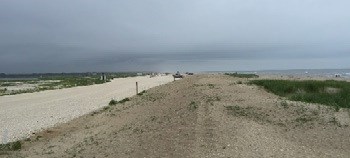Last updated: January 19, 2017
Article
Natural Parking Lots at Assateague Island National Seashore

Photo: Thomas Sheffer
Fast facts
Location: Maryland & Virginia
PMIS#: 231221, 194834, 194874
Compliance (PEPC ID): Environmental assessment (52476) (rubber mats provide accessible parking spaces - see image below)
Cost/fund source: $700,000-$800,000 (for a 961-space lot)/fee revenue
Installation time: 45-60 days
Type of material/product used: Clam shells and locally sourced clay/sand mix
Contact information: Chief of Facilities, Assateague Island National Seashore, 410-641-1441
Background
Overwash events used to deposit asphalt from parking lots onto nearby beaches and create a persistent problem. Due to these harmful impacts, park managers decided to begin replacing asphalt parking lots with clay and clam shells, materials natural to the area
Description
The park surfaces parking lots with 12” of clay and 2” of clam shells. Using a clay/sand mix provides better drainage; pure clay is not recommended. The natural parking lots require more maintenance but reduce financial costs and negative impacts on the environment; asphalt parking lots would likely cost twice as much.
Maintenance needs
For a very exposed area, the parking lot needs to be brushed approximately twice per week (60-90 minutes for one crewmember to complete). For less exposed areas, the parking lot only needs to be brushed about every other week. Park staff designed and
constructed a custom rake for brushing purposes. Additional clay and clam shells are added every year and after storms to replenish lost materials. Following a severe storm event, between 2” and 4’ of sand can be deposited onto the parking lots. Once the sand is removed, the crew can set the elevation for the parking lot and proceed to fill it to the
needed levels.
Related projects to watch
Point Reyes National Seashore plans to restore sections of one ocean-side parking lot to beach and another one back to wetlands. This transition would help return the site to a
natural state and attenuate storm surge and erosion impacts to the remaining parking surface.
